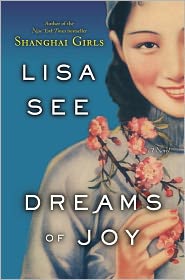 Readers of Shanghai Girls, the 2010 New York Times bestseller from Lisa See about sisters Pearl and May, will be glad to know that See has continued their story with this year's Dreams of Joy. Having narrowly escaped the Japanese bombing of Shanghai in 1937, the sisters find themselves setting sail for America to live in marriages arranged by their father to pay off his gambling debts. Shanghai Girls covered the lives of Pearl and May from 1937 through 1957. Dreams of Joy picks up right where it left off, this time focusing on Joy, daughter of Pearl, but biological daughter of May.
Readers of Shanghai Girls, the 2010 New York Times bestseller from Lisa See about sisters Pearl and May, will be glad to know that See has continued their story with this year's Dreams of Joy. Having narrowly escaped the Japanese bombing of Shanghai in 1937, the sisters find themselves setting sail for America to live in marriages arranged by their father to pay off his gambling debts. Shanghai Girls covered the lives of Pearl and May from 1937 through 1957. Dreams of Joy picks up right where it left off, this time focusing on Joy, daughter of Pearl, but biological daughter of May.Convinced that she is to blame for her father's problems with the FBI, and his subsequent death, Joy is determined to leave her family in Los Angeles' Chinatown. Her studies at the University of Chicago and participation in a Chinese students organization open her eyes to the lies that she believes the United States has told about China and Chairman Mao. When Chairman Mao issues a call for those of Chinese descent to return to their homeland, Joy sees not only an opportunity to participate in the Great Leap Forward, but to also meet the artist father that she recently discovered. Filled with a naivete that many teens and twentysomethings possess, Joy soon finds that the magical world she imagined is less than desirable and anything but magical.
The Great Leap Forward of the People's Republic of China (PRC) was an economic and social campaign of the Communist Party of China (CPC), reflected in planning decisions from 1958 to 1961, which aimed to use China's vast population to rapidly transform the country from an agrarian economy into a modern communist society through the process of rapid industrialization, and collectivization. The Great Leap ended in catastrophe, resulting in tens of millions of excess deaths.[2] Estimates of the death toll range from 16.5 to 46 million,[3][4][5] with estimates by demographic specialists ranging from 18 to 32.5 million.[6] Historian Frank Dikötter asserts that "coercion, terror, and systematic violence were the very foundation of the Great Leap Forward" and it "motivated one of the most deadly mass killings of human history."
As it was in Shanghai Sisters, Dreams of Joy is told in first person by Joy and, also, by Pearl. It's interesting to see the changes in Shanghai through the eyes of Pearl, who has returned to retrieve her daughter. It's also interesting to note the changes in Joy's voice from the idealistic youth who first arrives in Shanghai to the realistic adult she becomes in a few short years. Fans of historical fiction and/or mother-daughter relationship are sure to appreciate this one.
What did you like about this book?
Pearl and May have such a strained relationship, even though they're best friends and sisters. I was worried that there would be no resolution to the argument that drove a big wedge between them. Dreams finds them working toward resolution through a series of letters written back and forth while Pearl is looking for May's daughter that she has raised as her own.
What didn't you like about the book?
Pearl discovers that a relative she thought had passed years ago was actually alive and living in a village that they come across. It seems a little fairytale-ish and unlikely that out of all the villages in China, they would pass through this particular one. It doesn't take away from the story, and perhaps it's cynical of me to think that this couldn't happen, but as a reader, you'll need to judge for yourself.
What could the author do to improve this book?
There's very little to improve. The historical references were very enlightening and offered much insight into a period of which most Americans are probably unaware.
368pp
Published: May 2011


No comments :
Post a Comment